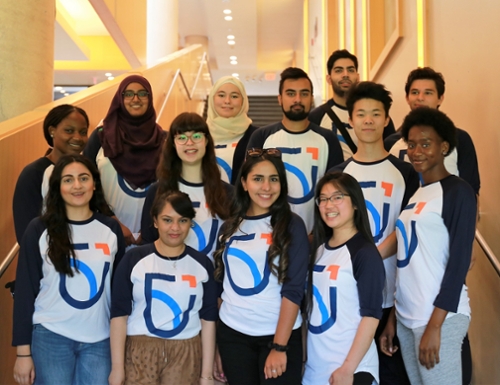The Perks of Being a Research Assistant
July 10, 2024
Research is an ever-growing industry that only continues to progress. Undergraduate research continues to increase our world’s knowledge in various fields, including science, health care, business, and more. These discoveries lead to further advancement and interventions for better outcomes. What’s exciting is that students can engage in research and find their fields of interest!
In the various programs available at Ontario Tech University, different departments have professors with research projects. Students can greatly benefit from research opportunities! It allows them to learn something new while acquiring professional development skills. Students can then utilize the skills they develop beyond an academic environment.
What is a student research assistant?
A student research assistant takes on various responsibilities by supporting the professor and grad students in the lab. These tasks can include interpreting, analyzing, and collecting data. Depending on the type of lab, you may also have the opportunity to help with experiments by organizing data and writing literature reviews. Working as a research assistant has more structure as you’re usually given clear instructions and materials to work with.
The main objective of being a research assistant is to grow and learn. This opportunity is geared to help students gain various skills and hands-on experience. There is often a misconception that research can conflict with a student’s studies. However, I would disagree! Research can significantly complement a student's academic performance and career aspirations. Research only continues to expand across educational institutions. Students play a crucial role in developing and maintaining these initiatives!
Potential duties and responsibilities
In an undergraduate research lab, the lab’s supervisor and team will direct you to tasks and provide you with instructions. Your responsibilities can vary depending on the type of lab you’re working under. Responsibilities include organizing notes/files, collecting/analyzing samples, writing reports/literature reviews, managing meetings, clerical tasks, conducting interviews, gathering participants, etc.
Although some tasks seem repetitive, these skills can further improve a student's ability to work in rigorous and demanding environments. The role of a research assistant can prepare students to manage many responsibilities. These diverse yet challenging tasks can strengthen students' critical thinking, communication skills, and academic writing.
Why you should become a research assistant
Research can provide students with a solid academic foundation. As students prepare to pursue a career or further education, gaining experience within a lab setting can allow them to effectively identify and resolve issues, form insightful questions, and find solutions. By doing so, students can truly discover their research interests and if it is a career they should pursue.
Becoming a research assistant gives students independence in thought and the motivation to learn and actively participate in new environments. When students can actively learn, they can identify their interests. Research labs allow students to discover and develop their interests, which is not an opportunity they may find outside.
Professors with research projects often aim to provide mentorship opportunities to students who work in their labs. Mentorship contributes to student skill-building and professional networking. So, students must take advantage of this opportunity for future references if applying to graduate school. Research opportunities can also strengthen your resume and allow you to have your name as a part of published work.
Unlock opportunities!
Being a research assistant can be a rewarding experience if you take advantage of the available opportunities. You are often expected to work well independently and in teams. This allows you to adopt technical skills and apply various methodologies and research techniques. You gain experience analyzing quantitative and qualitative data, learn to use different programming systems, gain verbal and written communication expertise, etc. Regardless of whether you pursue a research career, you gain various interpersonal skills that you can apply in different fields! So, it’s crucial that you seek out research opportunities inside and outside academia!
Ontario Tech University has various research initiatives, including the research awards program, university works, honors thesis, lab-directed research courses, etc, where you gain hands-on experience! Be sure to reach out to professors with research interests similar to yours. By making early connections, you will open up so many doors for you to be successful in your education and career! In addition, many institutions and organizations have summer research opportunities you can pursue (i.e., SickKids). Remember, never limit yourself. Research may seem overwhelming, but it is a rewarding experience!

Research Awards: https://research.ontariotechu.ca/students/ura/index.php
University Works: https://safa.ontariotechu.ca/university-works/index.php
Ontario Tech Research: https://research.ontariotechu.ca/
Resources
https://www.indeed.com/career-advice/finding-a-job/what-is-student-research-assistant
https://www.ncbi.nlm.nih.gov/pmc/articles/PMC9420469/
https://www.viu.ca/blog/why-should-you-do-research-undergraduate-student






